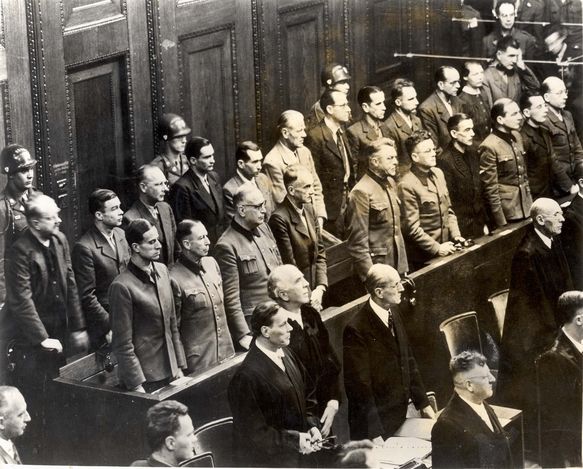The Significance of the Nuremberg Code
The universal right of Informed Consent to medical interventions
has been recognized in US law since at least 1914.
- That year, the New York Court of Appeals established the right to informed consent
to medical intervention in a case involving non-consensual surgery.
Schloendorff v. Society of New York Hospital 105 N.E. 92, 93 N.Y. (1914)
Justice Benjamin Cardozo articulated the court’s reasoning:
- “Every human being of adult years and sound mind has a right to determine
what shall be done with his own body; and a surgeon who performs an operation without his patient’s consent commits an assault for which he is liable in damages.”
2. The 1947 Nuremberg Code is the most important legal document in the history of medical research ethics. It established 10 foundational principles of ethical clinical research.
- The first and foremost principle is unequivocal:
“The voluntary consent of the human subject is absolutely essential”.
It prohibits research to be conducted on human beings without the informed consent of the individual.
The significance of the Nuremberg Code is as follows:
- The Nuremberg Code was formulated by prominent US government jurists in consultation with prominent US medical consultants;
- It had the multilateral agreement of the governments of the US, USSR, France and the UK;
- The Nuremberg Code extended human rights beyond the borders of individual countries;
- The right of Informed Consent is recognized in time of peace and in time of war.
- The Nuremberg Code provides legal justification to litigate violations of informed consent.

- Under the Nuremberg Code, responsibility for violations of informed consent rests upon individual doctors, government officials – and their aiders and abettors – each of who can be prosecuted for crimes against humanity.
“Among the nonconsensual experiments that the tribunal cited as a basis for their convictions were the testing of drugs for immunization against malaria, epidemic jaundice, typhus, smallpox and cholera. Seven of the convicted doctors were sentenced to death and the remaining eight were sentenced to varying terms of imprisonment.
The American tribunal’s conclusion that action that contravened the Code’s first principle constituted a crime against humanity is a lucid indication of the international legal significance of the prohibition on nonconsensual medical experimentation.”
Telford Taylor explained:
“Nuremberg was based on enduring [legal] principles and not on temporary political expedients, and this fundamental point is apparent from the reaffirmation of the Nuremberg principles in Control Council Law No. 10, and their application and refinement in the 12 judgments rendered under that law during the 3-year period, 1947 to 1949.”
3. In the wake of public disclosure of the U. S. government Tuskegee Syphilis experiment (1932-1972), the government convened the National Commission for the Protection of Human Subjects of Biomedical and Behavioral Research. The Commission issued The Belmont Report: Ethical Principles and Guidelines for the Protection of Human Subjects of Research (1979).
The Belmont Report acknowledges at the outset that the Nuremberg Code “became the prototype of many later codes intended to assure that research involving human subjects would be carried out in an ethical manner.”
However, federal regulations only apply to government-sponsored human research and, unlike the Nuremberg Code these regulations have been “modified” in response to political pressure. For example, 45 CFR 46.408(c) waives parental consent for the use of children as human subjects. “This waiver is usually but not always limited to minimal risk research…”
4. The first US Supreme Court decision in which the Nuremberg Code was invoked was in 1987. The plaintiff was a Sergeant in the US Army who sought compensation — having been a victim in a covert CIA-sponsored, LSD mind-control experiment.
US v. Stanley, 483 YS 669 (1987)
Justice Brennen wrote the dissenting opinion – joined by justices Marshal, Stevens & O’Connor:
- “In experiments designed to test the effects of [ ] LSD, the Government of the United States treated thousands of its citizens as though they were laboratory animals,
dosing them with this dangerous drug without their consent. One of the victims,
James B. Stanley, seeks compensation from the Government officials who injured him… - …it is important to place the Government’s conduct in historical context.
The medical trials at Nuremberg in 1947 deeply impressed upon the world that
experimentation with unknowing human subjects is morally and legally unacceptable.The United States Military Tribunal established the Nuremberg Code
as a standard against which applies to all citizens— soldiers as well as civilians.”
- Its first principle was: “The voluntary consent of the human subject is absolutely essential”.
5. In 1994, the Advisory Committee on Human Radiation Experiments was tasked with investigating and documenting the scope of unethical US government human radiation experiments. The (ACHRE) Report (1995) includes CIA mind-control experiments and devotes two chapters to the Nuremberg Code, and describes the growing influence that the Nuremberg Doctors Trial and the Nuremberg Code had on the American medical establishment.
Whereas in the 1949 edition of the best-known textbook of American medical jurisprudence, Doctor and Patient and the Law by Louis Regan a physician and lawyer, did not even cite the Nuremberg Code, devoting merely a few lines to the subject of human experimentation, in the 1956 edition, the subject was expanded to three pages, and the judges’ preamble to the Code was reiterated verbatim (without quotation marks). Dr. Regan added, “all agree” about these principles. They are “the most carefully developed set of precepts specifically drawn to meet the problem of human experimentation.”
The ACHRE report notes that: “while the [Stanley] suit was unsuccessful, dissenting opinions put the Army–and by association the entire government–on notice that use of individuals without their consent is unacceptable. The limited application of the Nuremberg Code in U.S. courts does not detract from the power of the principles it espouses…” ACHRE Report Chapter 2 & Chapter 3 (1995)
6. In 2001, the Maryland Court of Appeal explicitly cited the Nuremberg Code as a source of legally enforceable ethical standards in the case against the Kennedy Krieger Institute.
The case involved a government lead abatement experiment that exposed inner city Black toddlers to lead paint. The purpose was to record the damaging effects of lead.
The parents were not informed about the purpose or the risks.
Grimes / Higgins v Kennedy Krieger Institute, Maryland Court of Appeals,
366 Md 29; 782 A2d 807 (2001)
“The researchers and their Institutional Review Board apparently saw nothing wrong with the search protocols that anticipated the possible accumulation of lead in the blood of otherwise healthy children as a result of the experiment, or they believed that the consents of the parents of the children made the research appropriate.”
“Of special interest to this Court, the Nuremberg Code, at least in significant part, was the result of legal thought and legal principles, as opposed to medical or scientific principles, and thus should be the preferred standard for assessing the legality of scientific research on human subjects. Under it, duties to research subjects arise.
The Nuremberg code [i]s a summary of the legal requirements for experimentation on humans The Code requires that the informed, voluntary, competent, and understanding consent of the research subject be obtained. Although this principle is placed first in the Code’s ten points, the other nine points must be satisfied before it is even appropriate to ask the subject to consent.
The Nuremberg Code is the ‘most complete and authoritative statement of the law of informed consent to human experimentation.’ It is also ‘part of international common law and may be applied, in both civil and criminal cases, by state, federal and municipal courts in the United States.’
7. In 2009, the U.S. Second Circuit Court of Appeals in the Southern District of New York cited the Nuremberg Code as:
- “the universally accepted norm in customary international law
regarding nonconsensual medical experimentation.”
The case involved Pfizer which conducted an unapproved, trial of its experimental antibiotic, Trovan on children in Nigeria. The court found Pfizer guilty.
- Rabi Abdullahi, et al. v. Pfizer, Inc., 562 F.3d (2d Cir. 2009)
8. In 2013, the US Supreme Court reiterated the legal principle of informed consent
in a case involving a citizen who refused to consent to a blood test. A blood sample was taken against his will on orders of a police officer. In a 6 to 3 ruling, the Supreme Court ruled in favor of the plaintiff — even as the justices recognized that both privacy and harm were minimal.
Missouri vs McNeely, 569 US 141 (2013)
- “this Court has never retreated from its recognition that any compelled intrusion into
the human body implicates significant, constitutionally protected privacy interests…”
9. On March 1st Isaac Legaretta, a New Mexico Detention Center Officer filed the first
US Lawsuit Over Mandatory Covid Vaccines. DOCKET: No. 2:21-cv-00179
His attorney Ana Garner told Bloomberg News: “You can’t be forced to be a human guinea pig. We have the right to bodily integrity.”
10. On March 7th an Israeli citizens group filed a a petition to the International Criminal Court charging the Israeli Government with violating the Nuremberg Code with its mandatory Vaccination policy
Anshe Ha-Emet (People of the Truth) a fellowship, composed of Israeli doctors, lawyers and citizens, filed a complaint against the government national “medical experiment” without the informed consent of the citizens. Attorneys Ruth Makhachovsky and Aryeh Suchowolski filed the complaint stating:
“When the heads of the Ministry of Health as well as the prime minister presented the vaccine in Israel and began the vaccination of Israeli residents, the vaccinated were not advised, that, in practice, they are taking part in a medical experiment and that their consent is required for this under the Nuremberg Code”.
On March 19th a group of researchers from Norway have filed a lawsuit charging the Norwegian government corona policy is a Crime Against Humanity. under the leadership of Dr. Reiner Fuellmich and his team of investigators and lawyers. Read the English translation here or download the official document (in Norwegian) here.
************
The Nuremberg Code
Permissible Medical Experiments
From the trial transcript
The great weight of the evidence before us is to the effect that certain types of medical experiments on human beings, when kept within reasonably well-defined bounds, conform to the ethics of the medical profession generally. The protagonists of the practice of human experimentation justify their views on the basis that such experiments yield results for the good of society that are unprocurable by other methods or means of study. All agree, however, that certain basic principles must be observed in order to satisfy moral, ethical and legal concepts:
- The voluntary consent of the human subject is absolutely essential.
This means that the person involved should have legal capacity to give consent; should be so situated as to be able to exercise free power of choice, without the intervention of any element of force, fraud, deceit, duress, over-reaching, or other ulterior form of constraint or coercion; and should have sufficient knowledge and comprehension of the elements of the subject matter involved as to enable him to make an understanding and enlightened decision. This latter element requires that before the acceptance of an affirmative decision by the experimental subject there should be made known to him the nature, duration, and purpose of the experiment; the method and means by which it is to be conducted; all inconveniences and hazards reasonably to be expected; and the effects upon his health or person which may possibly come from his participation in the experiment.
The duty and responsibility for ascertaining the quality of the consent rests upon each individual who initiates, directs or engages in the experiment. It is a personal duty and responsibility which may not be delegated to another with impunity.
- The experiment should be such as to yield fruitful results for the good of society, unprocurable by other methods or means of study, and not random and unnecessary in nature.
- The experiment should be so designed and based on the results of animal experimentation and a knowledge of the natural history of the disease or other problem under study that the anticipated results will justify the performance of the experiment.
- The experiment should be so conducted as to avoid all unnecessary physical and mental suffering and injury.
- No experiment should be conducted where there is an a priori reason to believe that death or disabling injury will occur; except, perhaps, in those experiments where the experimental physicians also serve as subjects.
- The degree of risk to be taken should never exceed that determined by the humanitarian importance of the problem to be solved by the experiment.
- Proper preparations should be made and adequate facilities provided to protect the experimental subject against even remote possibilities of injury, disability, or death.
- The experiment should be conducted only by scientifically qualified persons. The highest degree of skill and care should be required through all stages of the experiment of those who conduct or engage in the experiment.
- During the course of the experiment the human subject should be at liberty to bring the experiment to an end if he has reached the physical or mental state where continuation of the experiment seems to him to be impossible.
- During the course of the experiment the scientist in charge must be prepared to terminate the experiment at any stage, if he has probable cause to believe, in the exercise of the good faith, superior skill and careful judgment required of him that a continuation of the experiment is likely to result in injury, disability, or death to the experimental subject.
[Trials of War Criminals before the Nuremberg Military Tribunals under Control Council Law No. 10. Nuremberg, October 1946–APRIL 1949. Washington, D.C.: U.S. G.P.O, 1949–1953.]




